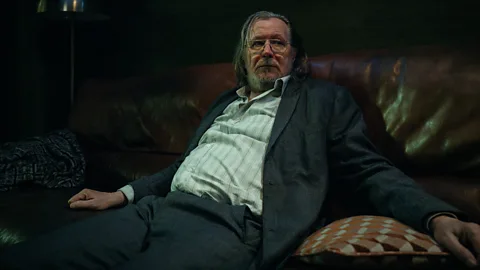 Apple TV+
Apple TV+With a new series launching today, Apple TV+’s spy show about MI5 rejects is more popular than ever. As with the Mick Herron books it’s based on, it has lots to say about the UK today.
It is a show about, in the words of its theme song written by one Mick Jagger, “losers, misfits and boozers”, yet it is an out-and-out winner. Apple TV+’s Slow Horses is a huge hit with viewers and universally acclaimed by critics. Based on a series of novels by Mick Herron, it only premiered in April 2022 but was immediately recognised as a jewel in the streaming service’s crown and is now on its fourth season, which premieres today. Its third season has been nominated for a host of awards at next weekend’s Emmys, while a fifth has already been filmed.
The “Slow Horses” of the title are failed MI5 agents put out to pasture in what Herron describes in the books as an “administrative oubliette” called Slough House – hence their nickname. Slough House is “like prison”, says Sid Baker (Olivia Cooke), one of its inmates in the first season. “You’re not supposed to ask what you’re in for.” These spooks either messed up on a mission or are battling an addiction to drink or drugs or gambling or, in the case of one of them, are simply so obnoxious that no-one can bear having them around. Now they’re serving out their time in a dilapidated office in which a broom banged on the floor is the closest thing to an internal comms system. They’re all desperate to get back to “the Park”, as MI5’s fictional headquarters in London’s Regent’s Park is known, although no-one ever has made it back. It’s the job of Jackson Lamb (Gary Oldman), who is in charge of Slough House, to try to get these MI5 rejects to quit. The agency would prefer they do that rather than fire them.
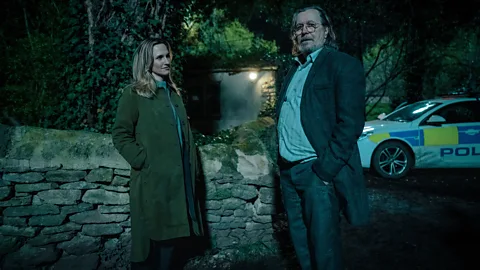 Apple TV+
Apple TV+At the heart of the show is Oscar-winner Oldman’s gloriously unvain portrayal of Lamb. Jackson Lamb has elevated being a slob to an art form. His straggly, thinning hair, untouched by a barber’s hand, hasn’t been washed in months, if ever. His clothes look as though they are held together by their stains. His socks are more hole than hose. He proudly gives free rein to his flatulence and to watch him eat is to experience a shuddering cosmic horror. He smokes incessantly, he drinks heavily, he smells… less than great. It’s difficult to imagine a character further removed from the iconic spy of page and screen, James Bond, smart, sophisticated, irresistible to women. Nor is he a George Smiley – John Le Carré’s quiet master-spy portrayed by Oldman in a classy 2011 film adaptation of Tinker, Tailor, Soldier, Spy.
Contrary to appearances, however, Lamb is tough, clever and highly competent. Herron has said of him that he “must have been a Bond, a Smiley, a hero of some sort, at one point of his life, but has seen through all of that, and reacted against it, to become what he is. He’s not really an opposite. He’s just come through the other side”. His boss, Diana Taverner (Kristin Scott Thomas), the steely deputy head of MI5, is as well-groomed as Lamb is dishevelled, but although repulsed by him, she has a respect for him too.
Lamb torments his staff with acerbic, sarcastic put-downs and thinks them useless idiots – or professes to. “I didn’t mean to kill him,” one of his agents who has accidentally despatched a Slough House intruder tells him. “Of course you didn’t. If you’d meant to kill him, he’d still be alive,” sneers Lamb. But his disdain might be feigned for professional purposes. “God, you really care about them, don’t you?” Taverner says to him at one point.
The stories’ fundamental appeal
Author and journalist Helen Lewis, a staff writer at The Atlantic and a fan of the books and the show says: “Slough House is a twisted kind of family. Jackson Lamb can be rude about his Slow Horses, but he’ll defend them against anyone else.
“Lamb is an appealing character – although he’s a spy, his situation is relatable to lots of viewers: he’s good at what he does, but trapped in a ridiculous bureaucracy that screws everything up. He quietly puts up two fingers at his bosses, which lots of people would love to do.”
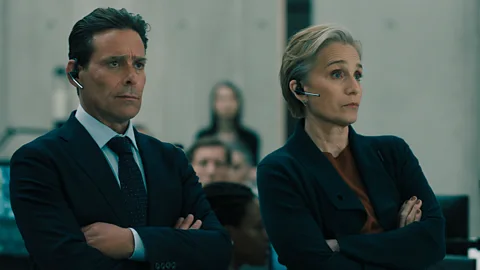 Apple TV+
Apple TV+Slow Horses blends laugh-out-loud-funny black comedy with compelling drama and thrilling action sequences. Thanks to the brilliant cast (Jack Lowden, Saskia Reeves and Rosalind Eleazar among them) and the sharp writing, we care about the Slow Horses as much as Lamb does and because Herron is completely unsentimental about killing off popular characters (he’d originally planned to blow up Slough House at the end of the first novel but changed his mind while writing it), there is a real sense of jeopardy. At the start of a season or a novel, it’s not a given that our favourites will make it out alive at the end of it. Season four is no exception. The opening episode is one of the best in the show so far, featuring a terrorist attack, a shocking killing and some brilliant Jackson Lamb zingers. There’s a new First Desk, a glamorous new head of the Dogs and one of the Slow Horses has to undertake a foreign excursion.
The original books
For the most part, the show sticks pretty closely to the books. Herron started writing detective fiction while working as a copy editor for a firm that published reports about legal proceedings and switched to spy fiction after the London bombings of 2005. The novels were slow to take off: Slow Horses “was pretty swiftly consigned to the realms of failure”, Herron told BBC Radio 4’s Broadcasting House. Things started to turn around when the small US publisher of the second book, Dead Lions, entered it for the prestigious CWA Gold Dagger award and it won. Now more than three million copies of the novels have been sold.
Herron has never been a spy (although he would say that, wouldn’t he?) but the world he has created has depth and feels entirely plausible, with spooks pursuing personal vendettas and operations compromised by internal rivalries. Even the jargon feels real: MI5’s brutal internal security operatives, often used as muscle, are “the dogs”; the service’s deputy chief is “second desk”; field agents are “joes”, a term borrowed from Le Carré.
Another reason for its success is the willingness of Apple TV+ to spend money. A scene in one episode in which one of the Slow Horses, Roddy Ho (Christopher Chung), deliberately crashes a double decker bus through the wall of a farmhouse was expensive to film, advances the plot not one inch and would have been easy to cut. Most production companies would have done so. But it sets up a series of funny lines and so was kept in.
The books and shows offer a critique of the state of Britain and something is definitely rotten in this state. Slow Horses is set in a London of grotty takeaways, depressing pubs and bin bags full of rubbish all over the streets. Herron’s Britain is deeply dysfunctional. There is incompetence, extremism and, everywhere, the stench of failure.
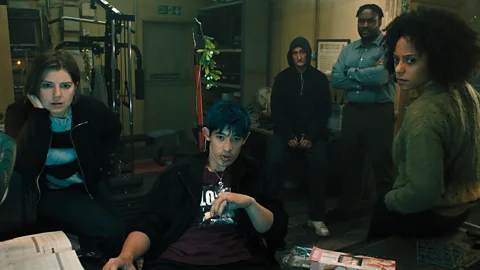 Apple TV+
Apple TV+Writer Amanda Craig says: “I have no doubt that not only is Mick Herron a fellow State-of-the-Nation novelist – that small but embattled tribe satirising Britain’s post-War decline and fall – but that he’s our most successful one. Where the rest of us have taken other things from Charles Dickens, Herron has focused most on the Bleak House vibe, giving us his semi-grotesque group of hopeless failures, the physical squalor of Slough House, savage portraits of our national corruption, inertia, gamesmanship and bureaucracy – and coupled it to a series of stylish, meticulously-plotted thrillers.
“In his gorgeously individuated failed spies, he dramatises the feelings of so many essentially decent, hugely frustrated ordinary Britons who sense they are pitted against the machinations of a sneering and almost untouchable elite. It’s both fabulous fun and scathingly critical.”
Lewis points out that “Slough House itself – a rundown office in central London – is the opposite of those sleek intelligence headquarters you see in films. Whereas Regent’s Park, where the ‘proper’ spies are based, is gleaming and high-tech. The two locations are a powerful metaphor for the way Britain would like to see itself, versus how faded our glory really is.”
One criticism that is sometimes levelled at the show – and it wouldn’t be levelled at many – is that each season is too short. Just six episodes invariably leaves fans wanting more. But Chung tells the BBC: “I think with the amount of content that’s out there at the moment, being able to get in and out of a story within six episodes and do it so efficiently and engagingly is quite extraordinary. Why flesh something out to eight episodes when you can get six cracker episodes?
“We watched the first episode of season four at a screening and I was just absolutely speechless at how much was fitted into the 45 minutes. There are so many different threads of story and so many different character journeys that you’re following and they’re all developed incredibly well. No one story thread seems lesser than any other. I think that’s incredibly hard to do.
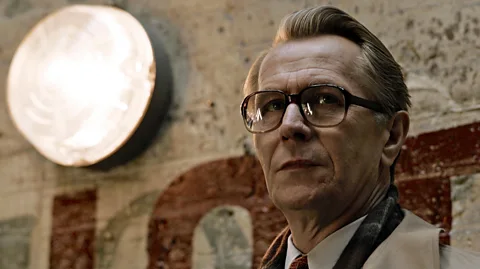 Alamy
Alamy“Slow Horses is on an upward trajectory. It really feels as though it’s hitting that Breaking Bad stride where everyone is starting to discover it and going back and watching the start so that’s really exciting.”
It’s unusual for a show these days to get five seasons. How long can it go on for? There are eight novels, with another out this year, and several novellas. Oldman has said he’s happy to play Lamb for as long as he is wanted and that he intends to retire once the show has ended. Herron told The Watch podcast that he finds the collaboration with the team who make the show exciting and energising and, in a huge vote of confidence in his work, Apple TV+ recently announced it would be making Down Cemetery Road, the first novel in his detective series about private investigator Zoe Boehm. All the signs are that Slow Horses could run and run.
The first two episodes of Slow Horses season four are released on Apple TV+ today, with new episodes released weekly.

